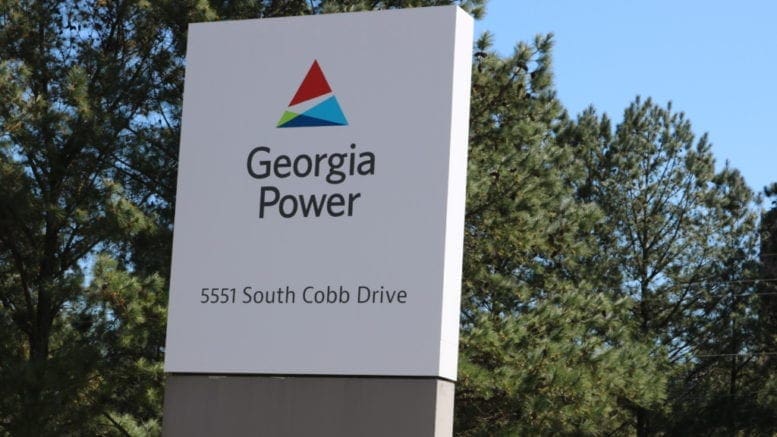by Stanley Dunlap, Georgia Recorder [This article first appeared in the Georgia Recorder, republished with permission]
December 16, 2022
The Georgia Public Service Commission is primed to vote Tuesday on Georgia Power’s three-year rate plan after the utility company and state regulatory staff agreed to a 39% lower hike on customers’ bills than originally proposed.
A trimmed down $1.8 billion deal that would prevent a sharp rise in electricity rates beginning in January was debated by the state’s largest utility company, the Public Service Commission, and investors for several hours Thursday. Nevertheless, the five-member commission must resolve a rift over the company’s profit margins and solar power’s future when it convenes Tuesday for a final decision.
Georgia Power and the Public Service Advocacy staff agreed on the stipulated agreement on Wednesday evening after months of tense negotiations on the company’s $2.9 billion proposal.
The original request would have added $14.32 onto the typical residential customer’s monthly costs starting in 2023, before topping out in 2025 at $17 higher than the current bill.
The stipulated agreement cuts down the overall increase, starting with a more affordable $3.60 monthly hike starting next year.
Commission attorney Daniel Walsh said the agreement was reached in mind of bracing for other multiple other increases looming over the next several years, with the company likely seeking $2 billion to recover fuel expenses and billions of more dollars once the two nuclear generators at Plant Vogtle are up and running.
“This is an opportunity for the commission to offer some relief to customers who still will have to withstand substantial rate increases over the next few years,” Walsh said. “The fact that we were able to reach agreement on the lion’s share of the issues in this case, and that a number of other parties have already signed onto the agreement, reflects that the parties negotiated in good faith.”
The most significant cost-saving changes in the pending agreement is a $180 million cut in operations and maintenance expenses, spending $600 million less on electric grid improvements and reducing electric vehicle infrastructure spending from $90 million by 75%.
Despite some significant concessions, Georgia Power attorney Brandon Marzo said the company remains confident that it can provide safe and efficient power to its 2.7 million customers as it transitions to cleaner energy sources.
“I will admit to you that this has been one of the more passionate cases that I’ve been a part of,” Marzo said. “It took a long time to work with the parties to get a reasonable, well balanced, result in this case and I guarantee you that we have done that.”
Before the commission adjourned Thursday, solar industry and clean energy advocates remained critical of the pending agreements not going far enough to support a popular rooftop solar program.
The 5,000 customers who participate in the monthly so-called net metering program, which allows them to sell back excess energy to the company, would be grandfathered in for 15 years.
The public service staff and company officials would determine whether a monthly minimum bill should be added before the program gets reviewed again in the scheduled 2025 rate case that sets targets for the following three years.
Georgia Power claims a more methodical analysis is needed to determine the best options for customers who don’t power their homes and businesses with solar power.
Georgia Solar Industries Association executive director Don Moreland said that it is now up to the elected commissioners to decide the fate of solar energy and help ensure that customers are fairly compensated “for the energy put back on the grid and solar rooftop users save money on the electric bill, especially in the face of rising rates.”
On Thursday, some commissioners and advocacy groups also questioned proposals to allow the utility provider to earn a significantly higher return on equity than the industry average.
Walsh said that under Georgia Power’s request, the company will be able to earn $945 million over the next three years above the stipulated margin before sharing excess profits with ratepayers.
Walsh suggested commissioners settle on a 10.5% return on equity rate, which is higher than the national average and would still result in an additional $210 million a year before the company reaches its earnings peak.
Commissioner Lauren “Bubba” McDonald asked whether it is wise to approve a rate increase for the next three years rather than having yearly rate cases that better factor the current financial situations. He said that regular businesses have been forced to operate more efficiently during the pandemic without the advantage of monopolies.
“It is one of the best run utilities in this country, no question, but did you know what Southern Company earned from Georgia Power over the last 10 years,” McDonald asked. “About $13.6 billion.”
Under the standards set by the Georgia PSC, profits above the earning cap are distributed by category, with 70% used to pay off company assets, 10% refunded to customers and the remaining 20% paid to Georgia Power shareholders.
Marzo said that the company is simply asking for a similar profit margin that has been in place since 2013, adding that the framework helped the company cope with the pandemic, inflation, and other issues.
“It will give the company the ability to manage the volatility that we’ve currently been experiencing and probably will experience the next three years,” he said.
Georgia Recorder is part of States Newsroom, a network of news bureaus supported by grants and a coalition of donors as a 501c(3) public charity. Georgia Recorder maintains editorial independence. Contact Editor John McCosh for questions: info@georgiarecorder.com. Follow Georgia Recorder on Facebook and Twitter.
